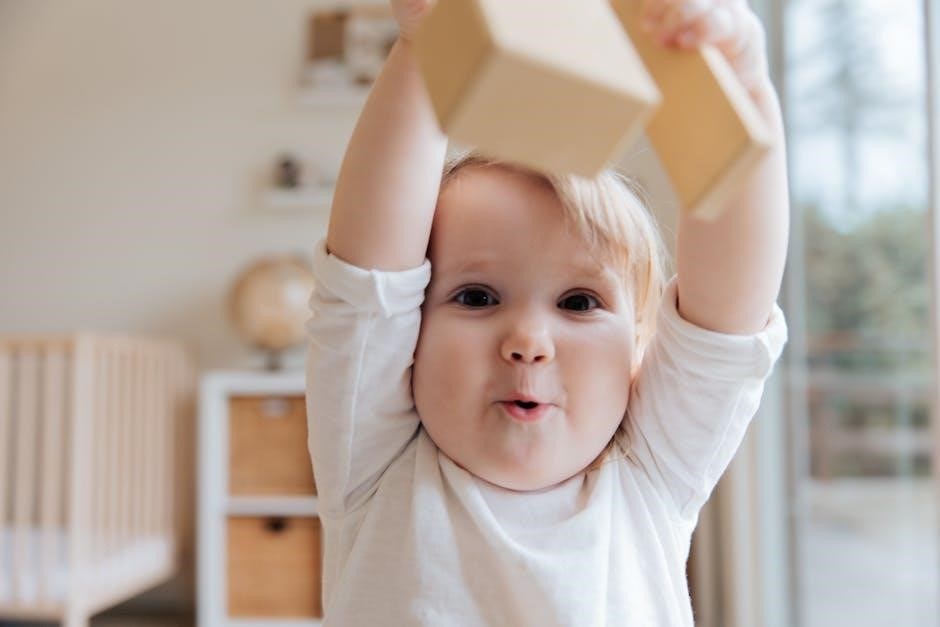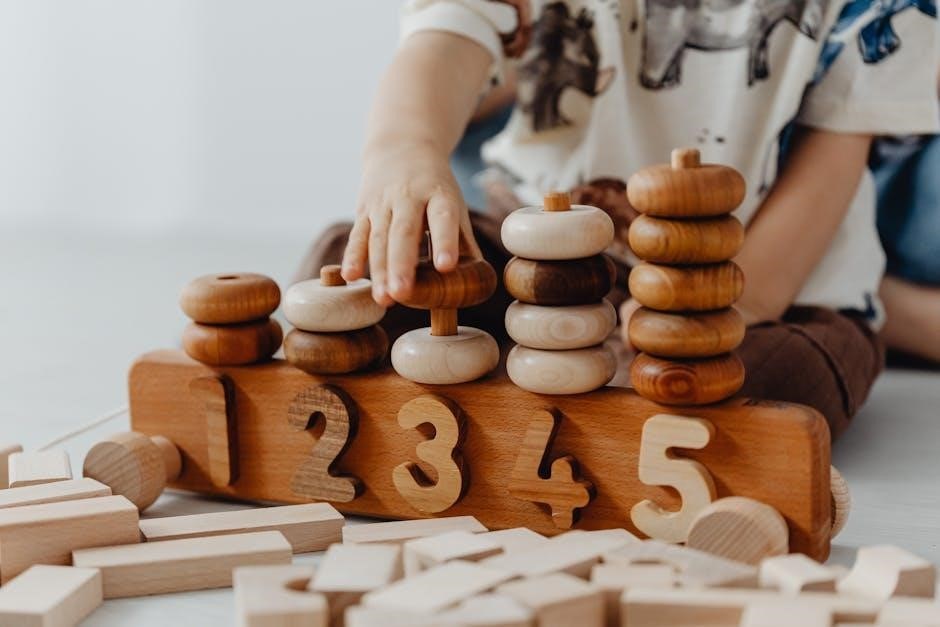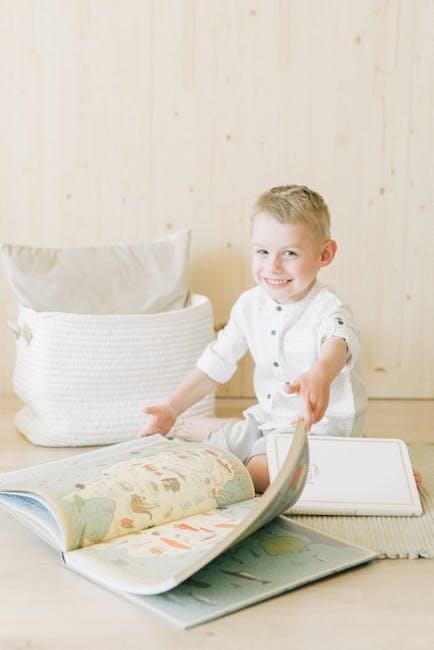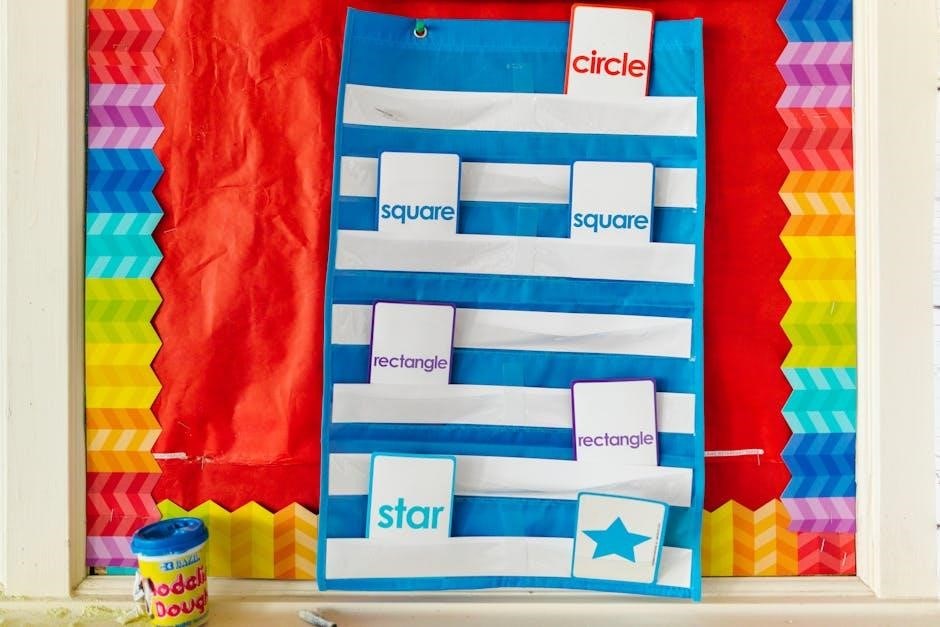The Iowa Early Learning Standards (IELS) provide a framework for understanding what young children should know and be able to do from birth to age five. These standards emphasize developmentally appropriate content and skills‚ aligning with the Iowa Core Standards to support smooth transitions and continuous learning. The IELS guide curriculum planning‚ assessment‚ and early childhood education practices‚ ensuring a strong foundation for future academic success.

1.1 Overview of IELS and Their Importance
The Iowa Early Learning Standards (IELS) are a set of guidelines that outline what young children from birth to age five should know and be able to do. These standards emphasize developmentally appropriate content and skills‚ focusing on key areas such as social-emotional‚ physical‚ language‚ and cognitive development. The IELS serve as a foundational tool for early childhood educators‚ caregivers‚ and families to ensure consistent and high-quality learning experiences. By aligning with the Iowa Core Standards‚ the IELS support a smooth transition from early childhood to formal education. They also provide a shared understanding of child development‚ helping to identify areas where children may need additional support. The standards are designed to be inclusive‚ addressing the diverse needs of all children‚ and they play a critical role in shaping curriculum planning and assessment practices across early care and education settings.

1.2 Vision of Early Childhood Iowa
The vision of Early Childhood Iowa is that every child‚ beginning at birth‚ will be healthy and successful. This vision underscores the importance of providing all children with the opportunity to thrive‚ regardless of their background or circumstances. It emphasizes the need for a coordinated system of care and education that supports the whole child—focusing on their social‚ emotional‚ physical‚ and cognitive development. By aligning with the Iowa Early Learning Standards (IELS)‚ Early Childhood Iowa aims to ensure that all young children have access to high-quality early care and education. This vision is driven by a commitment to equity and the belief that early childhood experiences lay the foundation for lifelong learning and success. The collective efforts of families‚ educators‚ and communities are essential to achieving this vision and fostering a bright future for Iowa’s children.

Key Areas of Development in IELS
The Iowa Early Learning Standards (IELS) outline key areas of development‚ including:
- Social-Emotional Development
- Physical Development
- Language and Literacy Development
- Cognitive Development
- Approaches to Learning
These areas ensure a holistic approach to early childhood education.
2.1 Social-Emotional Development
Social-emotional development in the Iowa Early Learning Standards (IELS) focuses on fostering skills like self-awareness‚ self-regulation‚ and social interactions. These standards encourage children to express curiosity and initiative in exploring their environment. By engaging in experiences‚ they develop essential life skills. The IELS emphasize the importance of supporting children as they learn to navigate emotions and build positive relationships with others. This foundation is crucial for their future academic success and personal well-being. The standards provide a guide for caregivers and educators to create environments that promote emotional growth and social competence‚ ensuring children are well-prepared for lifelong learning and social interactions.
2.2 Physical Development
The Iowa Early Learning Standards (IELS) highlight the importance of physical development‚ which includes gross and fine motor skills. These standards emphasize age-appropriate activities that promote coordination‚ balance‚ and overall physical well-being. Children are encouraged to engage in play that enhances their ability to run‚ jump‚ and manipulate objects‚ fostering independence and confidence. The IELS also address health and safety practices‚ ensuring young children develop habits that contribute to lifelong physical wellness. By aligning with these standards‚ caregivers and educators can provide opportunities for children to practice and refine their motor skills‚ preparing them for future challenges. Physical development is closely linked to other areas of growth‚ such as social-emotional and cognitive development‚ creating a holistic approach to early childhood education. This focus ensures children build a strong foundation for physical competence and overall success.
2.3 Language and Literacy Development
The Iowa Early Learning Standards (IELS) emphasize the importance of language and literacy development‚ focusing on skills that lay the foundation for reading‚ writing‚ and communication. These standards encourage children to develop receptive and expressive language abilities‚ including understanding and using vocabulary‚ following directions‚ and engaging in meaningful conversations. Early literacy skills‚ such as recognizing letters‚ understanding print awareness‚ and demonstrating an awareness of rhyming and word families‚ are also highlighted. The IELS promote interactive experiences‚ such as reading aloud‚ storytelling‚ and discussions‚ to foster a love for language and literacy. Additionally‚ the standards support children in developing an understanding of diverse texts and genres‚ preparing them for future academic success. By aligning with these standards‚ educators and caregivers can provide engaging and developmentally appropriate activities that nurture children’s language and literacy skills‚ setting the stage for lifelong learning and achievement.

2.4 Cognitive Development
Cognitive development in the Iowa Early Learning Standards (IELS) focuses on children’s growing ability to think‚ reason‚ and solve problems. This domain emphasizes the development of memory‚ attention‚ and critical thinking skills‚ which are essential for understanding the world around them. Children are encouraged to explore their environment‚ ask questions‚ and engage in activities that promote logical thinking and decision-making. The standards highlight the importance of fostering curiosity and initiative‚ as these traits encourage children to investigate and learn through hands-on experiences. By aligning with these standards‚ educators and caregivers can create opportunities for children to develop problem-solving strategies‚ classify objects‚ and demonstrate an understanding of cause-and-effect relationships. These skills not only enhance children’s cognitive abilities but also lay a strong foundation for future academic success and lifelong learning.
2.5 Approaches to Learning
Approaches to learning in the Iowa Early Learning Standards (IELS) focus on how children engage with their environment‚ explore new experiences‚ and develop strategies for learning. This domain emphasizes curiosity‚ initiative‚ and creativity‚ encouraging children to express interest and engage in activities that foster a love for learning. The standards highlight the importance of persistence‚ cooperation‚ and inventiveness‚ as these traits help children navigate challenges and build confidence. By fostering these approaches‚ caregivers and educators can help children develop the skills and mindset needed to tackle complex tasks and embrace lifelong learning. These standards also promote the idea that children’s learning is enriched when they are encouraged to explore‚ question‚ and discover the world around them‚ laying a strong foundation for future academic and personal success.
Alignment with Iowa Core Standards
The Iowa Early Learning Standards align with the Iowa Core Standards‚ ensuring a seamless transition and continuity in learning from early childhood through formal education‚ fostering academic readiness and success.

3.1 Transition from Early Childhood to Preschool
The transition from early childhood to preschool is a critical period that requires careful planning and alignment with the Iowa Early Learning Standards (IELS). These standards ensure that children are well-prepared for the next stage of their educational journey by building on the skills and knowledge they have already acquired. The IELS provides a developmental continuum that bridges early childhood experiences with preschool expectations‚ ensuring continuity in learning. This alignment helps educators and caregivers create a smooth transition‚ addressing the social‚ emotional‚ physical‚ and cognitive needs of children. By fostering a cohesive approach‚ the IELS supports the holistic development of children‚ preparing them for future academic success and lifelong learning. This strategic transition ensures that every child enters preschool with a strong foundation‚ ready to thrive in their educational environment.
3.2 Connection to Iowa Academic Standards
The Iowa Early Learning Standards (IELS) are intentionally aligned with the Iowa Academic Standards to ensure a seamless connection between early childhood education and later academic expectations. This alignment supports the development of skills and knowledge that are foundational for future academic success. By establishing clear expectations for what young children should know and be able to do‚ the IELS provide a strong foundation for meeting Iowa’s academic standards in elementary school. This connection emphasizes the importance of early learning experiences in preparing children for the rigor of formal education. The standards promote a continuum of learning‚ ensuring that children are well-prepared to meet the challenges of higher-grade levels. This alignment is critical for creating a cohesive educational system that supports children’s growth from early childhood through their academic careers.


Practical Applications of IELS
The Iowa Early Learning Standards provide practical tools for educators‚ guiding curriculum planning and assessment. They offer resources to support early childhood education‚ ensuring effective implementation and alignment with academic goals.
4.1 Curriculum Planning and Assessment
The Iowa Early Learning Standards (IELS) serve as a foundation for designing curriculum and assessment strategies in early childhood education. These standards emphasize developmentally appropriate practices‚ ensuring that activities are tailored to the unique needs and abilities of young children. By aligning curriculum planning with the IELS‚ educators can create engaging and effective learning experiences that promote cognitive‚ social-emotional‚ physical‚ and language development. Assessments are integrated into daily activities‚ allowing teachers to monitor progress and identify areas where additional support may be needed. This approach ensures that each child is prepared for future academic success‚ fostering a smooth transition into preschool and beyond. The IELS also provide a common language for communication among educators‚ families‚ and care providers‚ enhancing collaboration and consistency in early childhood education.
4.2 Tools and Resources for Implementation
To support the effective implementation of the Iowa Early Learning Standards (IELS)‚ a variety of tools and resources are available for educators and caregivers. These include comprehensive PDF guides‚ such as the Iowa Early Learning Standards 3rd Edition‚ which provide detailed frameworks and developmental continua for understanding what children should know and be able to do. Additional resources like curriculum planning templates‚ assessment tools‚ and activity guides help professionals design engaging and standards-aligned learning experiences. Professional development opportunities‚ webinars‚ and workshops are also offered to equip educators with the knowledge and skills needed to integrate the IELS into their practices. These tools and resources ensure that all early childhood professionals can effectively support young children’s growth and development‚ fostering a strong foundation for lifelong learning.
The Iowa Early Learning Standards (IELS) provide a vision for every child to be healthy and successful‚ ensuring a strong foundation for early childhood education and future growth in Iowa.
5.1 Impact of IELS on Early Childhood Education
The Iowa Early Learning Standards (IELS) have significantly influenced early childhood education by providing a common understanding of skills and knowledge children should acquire from birth to age five. These standards emphasize developmentally appropriate practices‚ ensuring that young children receive high-quality care and education tailored to their needs. By aligning with the Iowa Core Standards‚ the IELS facilitate a smooth transition from early childhood programs to formal schooling‚ promoting continuity and coherence in learning. They also serve as a tool for sharing information among families‚ caregivers‚ and educators‚ fostering collaboration and supporting children’s holistic development. The IELS have become a cornerstone for early childhood education in Iowa‚ shaping curriculum planning‚ assessment practices‚ and professional development‚ ultimately contributing to better learning outcomes for young children.
5.2 Future of Early Learning in Iowa
The future of early learning in Iowa is poised for growth and innovation‚ driven by the Iowa Early Learning Standards (IELS). These standards will continue to guide curriculum development‚ assessment practices‚ and professional training‚ ensuring high-quality education for young children. By aligning with the Iowa Core Standards‚ the IELS will support a seamless transition from early childhood programs to formal schooling‚ preparing children for long-term academic success. The vision of Early Childhood Iowa‚ which aims for every child to be healthy and successful‚ will remain a cornerstone of these efforts. As the IELS evolve‚ they will likely incorporate new research and technologies‚ fostering a more inclusive and equitable early learning system. Stakeholders‚ including families‚ educators‚ and policymakers‚ will play a crucial role in implementing these standards and addressing challenges like early literacy gaps and access to resources. The future of early learning in Iowa promises to be transformative‚ with a focus on innovation‚ collaboration‚ and equity.